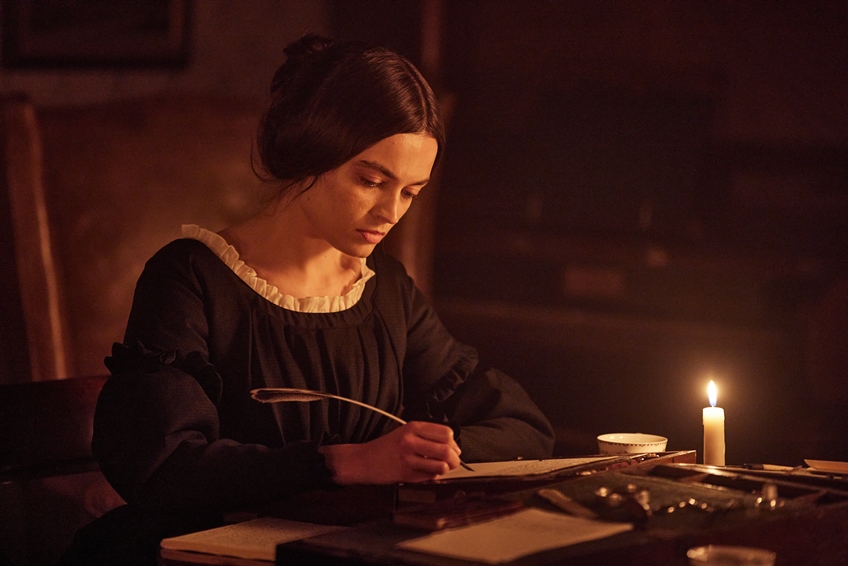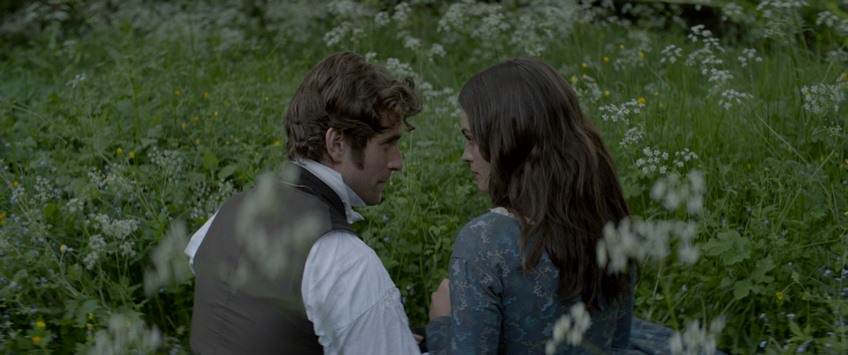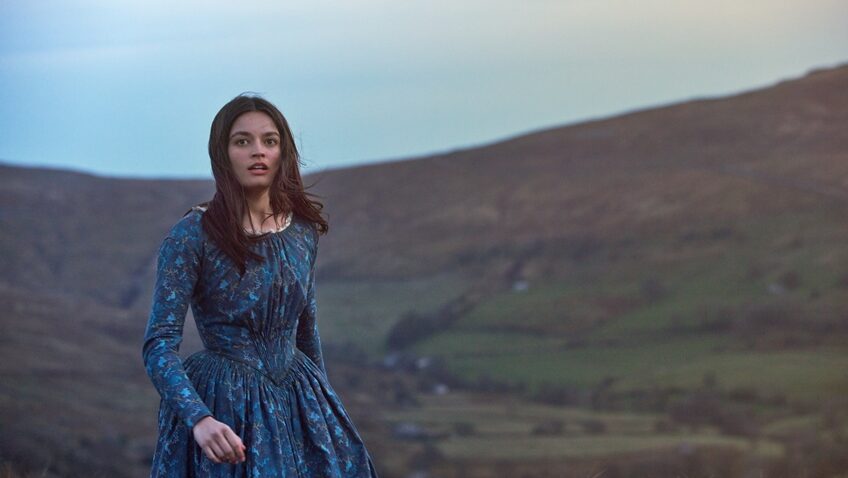Joyce Glasser reviews Emily (October 15, 2022) Cert 15, 130 mins.
Actress Frances O’Connor makes her feature film debut as writer and director with Emily, a visceral and thought-provoking imagined biopic of Emily Brontë, the author of Wuthering Heights. Although, as an actress, O’Connor knows her way around 19th century period dramas (Mansfield Park, The Importance of Being Ernest, the TV series, Madame Bovary), hers is a kind of anti-period drama. Watching Emily on the big screen you believe it when O’Connor says she has been obsessed with Emily Brontë since childhood. And the actress who brings O’Connor’s vision to life is Emma Mackey, an unconventional beauty whose casting is central to the film.
O’Connor has tackled the question everyone who has read and studied Wuthering Heights has to confront. How could a priest’s daughter from a remote West Yorkshire village who died unmarried at the family home age 30, with no known romantic relationships in her life, have written this novel? Rather than paint a realistic portrait O’Connor turns to expressionism.
Chronology and many historical facts are omitted or rearranged. O’Connor splashes her screen-canvas with images, inchoate emotions, characters, relationships, words, and fleeting looks that, when transformed by O’Connor’s own passionate imagination and wishful thinking, suggest a possible answer to the question.

Mackey appeared in Branagh’s Death on the Nile and the recent period biopic Eiffel, but most viewers will know her as the thoroughly modern bad girl Maeve Wiley from the Netflix series Sex Education. The mixture suits O’Connor’s character. Emily is a blend of the modern rebel who feels unanswerable to bourgeois society; the shy, insecure virgin, unprepared to leave the family home; the nature loving wild child, at home on the soggy moors, and the woman who created one of the steamiest and most passionate novels of doomed love ever written. Mackey makes her eyes work hard, but she conveys the various facets of her complex character with her entire body, body language, her energetic movement and way of speaking.
Although Emily’s father Patrick (Adrian Dunbar) was the village’s Irish-Anglican Priest and the children attended Church, Emily’s imagination transformed the British Gothic Novel and scandalised readers with the creation of the dark, wild Heathcliff, the absence of sermonising, and the author’s own moral ambiguity.
There were antecedents. The entire family read Byron. Charlotte had published Jane Eyre with its own Byronic hero, Mr Rochester. The difference is that Rochester repents for a happy ending, whereas godless Heathcliff makes that impossible.
It might have been hard to believe there was a god in Haworth, a village with one of the highest death rates per capita in the UK. Before the story opens Emily’s mother is a faded memory, and both Emily’s older sisters, Maria and Elizabeth, have died of tuberculosis before their 12th birthdays. They probably contracted TB at the Dickensian Cowan School, which might be one reason for Emily’s reluctance to go into teaching.
The film is bookended by the writing of Wuthering Heights, Emily’s only novel, although it refers to Emily’s (now lost) stories and her poetry. ‘Why is it so hard for you to believe that your sister might have written something of merit?’ an exhausted Emily asks Charlotte who interrogates her sister on her “base” debut. Right away O’Connor signals to the audience that she is not concerned with chronology: Charlotte had published Jane Eyre before Wuthering Heights, whereas in the film, it is the publication of Emily’s novel and her death that inspires her sisters to take their place at her desk.
There is little historic evidence of Charlotte’s critical and disapproving personality, but the Brontë children’s history was written posthumously with prejudice and ignorance. Emily being singled out with positive reviews for a small collection of poems that Charlotte, Emily and Anne had published in 1846 (Poems by Currer, Ellis, and Acton Bell), and Charlotte’s (Alexandra Dowling) brutal editing of Emily’s unpublished poetry after her sister’s death could hint at the rocky relationship, based on Charlotte’s jealousy that O’Connor dramatises. Convivial Anne (Amelia Gething) who is of little interest to O’Connor, plays the peacemaker.

Emily is not one for small talk and social niceties. Charlotte continually reminds her that the town refers to her as the strange one. But Charlotte has cause to be miffed. When their father takes on an assistant, the cultured, tall, dark, handsome and single Mr Weightman (Oliver Jackson-Cohen). Emily warns the flirtatious Charlotte not to trust him, and then enjoys a brief, but ardent affair that should have led to marriage.
It is as though this imagined affair were O’Connor’s gift to Emily, who at first, has the upper hand. She provokes the straightlaced curate with her candidness, modern thinking and fast learning (Weightman is supposed to improve her French – Mackey is bilingual) and he is clearly turned on by her physicality and impressed with a poem he finds. Their trysts, in an abandoned farmhouse makes you think of Cathy and Heathcliff, except for the unfortunate lack of chemistry between the two actors.
O’Connor is on more solid ground in suggesting Emily’s borderline incestuous relationship with her brother Branwell (Fion Whitehead – who looks like a Byronic hero) gave rise to Heathcliff, Cathy’s adopted brother in the novel. Both turn their backs on social convention and feel at home on the moors where they are attracted to one another with a kind of animal magnetism. If Emily is a social outcast, Branwell, addicted to drugs and alcohol and unable to keep a job, is a social pariah.
When we meet him, he has been accepted to the Royal Academy Schools, but shortly before Emily’s death, he is barely holding onto a job as a station master. O’Connor has to romanticise Branwell quite a bit in order to make this relationship work, and even has the two of them peeping into a manor house window as Heathcliff and young Cathy would peek into the Linton house window.
Production credits, including Abel Korzeniowski’s score, Nanu Segal’s unromantic, visceral cinematography, and Steve Summersgill and Cathy Featherstone’s set design are also key. They contribute to O’Connor’s vision of a modern woman stuck in a Victorian world; of a force of life, surrounded by early death.




